Trailing in Polls, Hovde, Republicans Hope For ‘Change Election’
A close examination of the campaign strategies for Wisconsin's high-profile U.S. Senate race.
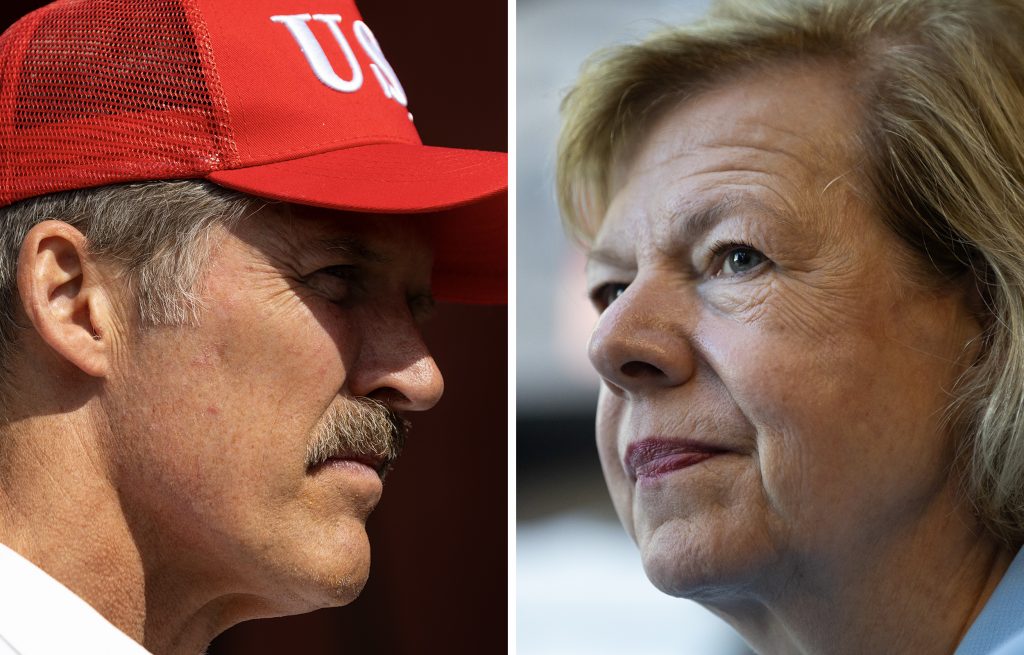
Left: Republican U.S. Senate candidate Eric Hovde is hoping 2024 is a change election. Right: U.S. Sen. Tammy Baldwin, D-Wis., has consistently led in the polls. (Joe Timmerman / Wisconsin Watch)
This story was produced and originally published by Wisconsin Watch, a nonprofit, nonpartisan newsroom. It was made possible by donors like you.
The race between U.S. Sen. Tammy Baldwin and Republican businessman Eric Hovde has reached a sort of stasis.
For months, the two campaigns have traded the same attacks. Baldwin has knocked Hovde for comments he made questioning the voting capabilities of nursing home residents and his suggestion that overweight people should pay more for health insurance. She also has argued that Hovde’s extraordinary wealth — he owns a real estate development company and at least part of Sunwest Bank, which is valued at $3 billion — leaves him incapable of looking out for everyday voters.
But in a political cycle focused on change, Wisconsin’s U.S. Senate race hardly feels like a referendum on Baldwin — despite her nearly 26 years in Washington. Most of the time, it seems like the two candidates are talking past one another, even as they court Wisconsin’s fussy independent voters, who have helped elect and re-elect both Baldwin and Ron Johnson, two senators with starkly different world views.
Baldwin’s message discipline has been on full display, talking up her own record while tearing Hovde down. Hovde, on the other hand, has committed considerable time to trying to dispel the senator’s attacks, and his campaign messaging, at times, gets bogged down by policy minutiae.
Baldwin has consistently had the advantage in a recent round of state polls. A recent Wisconsin Watch poll conducted by The MassINC Polling Group found Baldwin leading Hovde 52% to 44%. A Marquette Law School Poll released Wednesday showed a similar 53% to 46% lead for Baldwin.
Still, neither Democrats nor Republicans are ready to call the race. And, as a dozen politicos of all stripes interviewed for this story pointed out, anything can happen in a Wisconsin election.
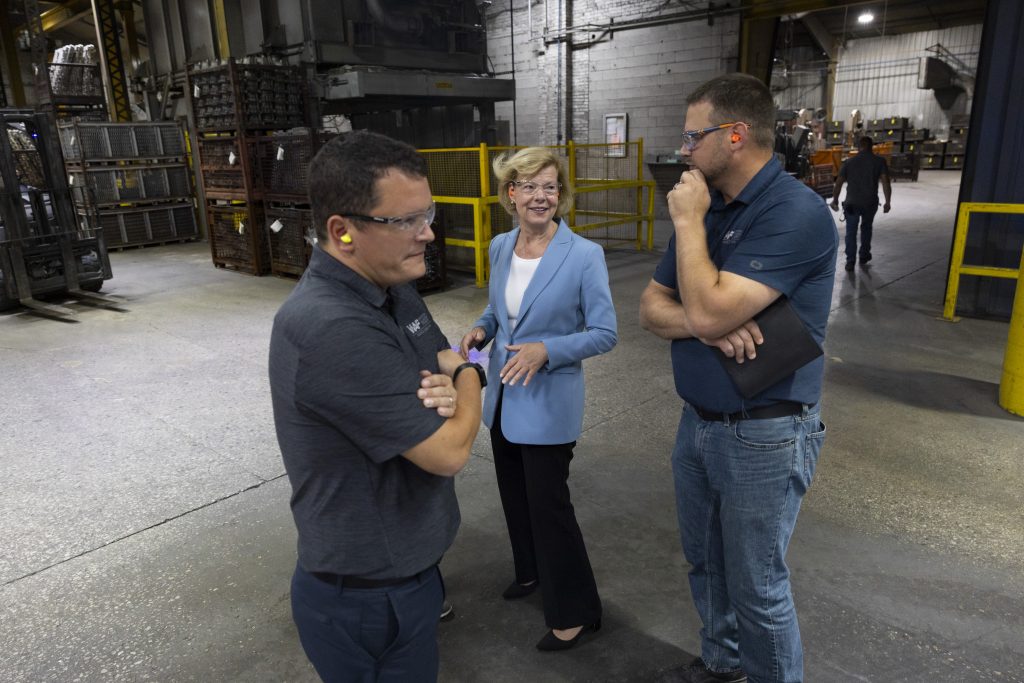
U.S. Sen. Tammy Baldwin, D-Wis., center, tours the Wisconsin Aluminum Foundry on Sept. 4, 2024, in Manitowoc, Wis. (Joe Timmerman / Wisconsin Watch)
Safety glasses on and ear plugs in, Baldwin stepped onto the buzzing factory floor of Wisconsin Aluminum Foundry’s expansive facility in Manitowoc on a recent September afternoon smiling and full of questions.
Walking through the roughly 300,000-square-foot facility, she asked about the wide range of metal products sitting in bins and on shelves around the foundry. Along the way, she stopped to shake hands with workers, waved at a forklift operator and intensely studied a high-tech 3D printer.
Days spent touring Wisconsin businesses help inform her work as a senator in Washington, she told a group of WAF employees after the tour. And those tours, many of which occur during her frequent visits to parts of the state outside the Democratic strongholds of Milwaukee and Dane County, have helped her remain relatively well-liked among rural and blue-collar voters while their support for many other Wisconsin Democrats has waned.
“The way Tammy Baldwin keeps winning, and winning by more than the average Democrat, is by refusing to write anyone or anywhere off and refusing to take anyone or anywhere for granted,” said Ben Wikler, chair of the Democratic Party of Wisconsin.
“One of her great strengths is being able to disagree without being disagreeable,” Wikler said. That quality, he added, helps her win support from voters who back Republican candidates in every other race on the ballot but cross partisan lines to vote for her.
Gov. Tony Evers, who himself has won five statewide elections, told Wisconsin Watch in an interview that it’s important for Baldwin to talk to voters even if they aren’t going to back her.
“Having a conversation with someone (who isn’t going to vote for you) isn’t going to change their mind,” Evers said. “But it may mitigate them going to their neighbor and saying, ‘She’s a jackass,’ or ‘He’s a jackass.’ They’ll probably say, ‘she’s wrong on this issue, but at least she’s talking to me.’ I think that’s being … a Wisconsinite.”
Baldwin has proven tough to beat. She’s never lost an election, dating back to the 1980s when she was first elected to the Dane County Board. And she’s faced formidable opponents, like former Gov. Tommy Thompson, whom she handily beat to win her Senate seat in 2012.
Baldwin attributes her success, at least in part, to two things.
“First of all, it’s a question of whose side you’re on, and voters have a choice for somebody who’s on their side,” she said, referring to herself, “or somebody who’s for the Wall Street and rich and connected.”
“Secondly, I think (it’s) partly because I do show up,” she said in an interview at Bronzeville Kitchen and Lounge in Milwaukee. “And while you can’t meet all 5.7 million Wisconsinites, if you show up over and over and over again, word gets out that I’m up there and that I’m fighting for folks who tell me what it is that challenges them.”
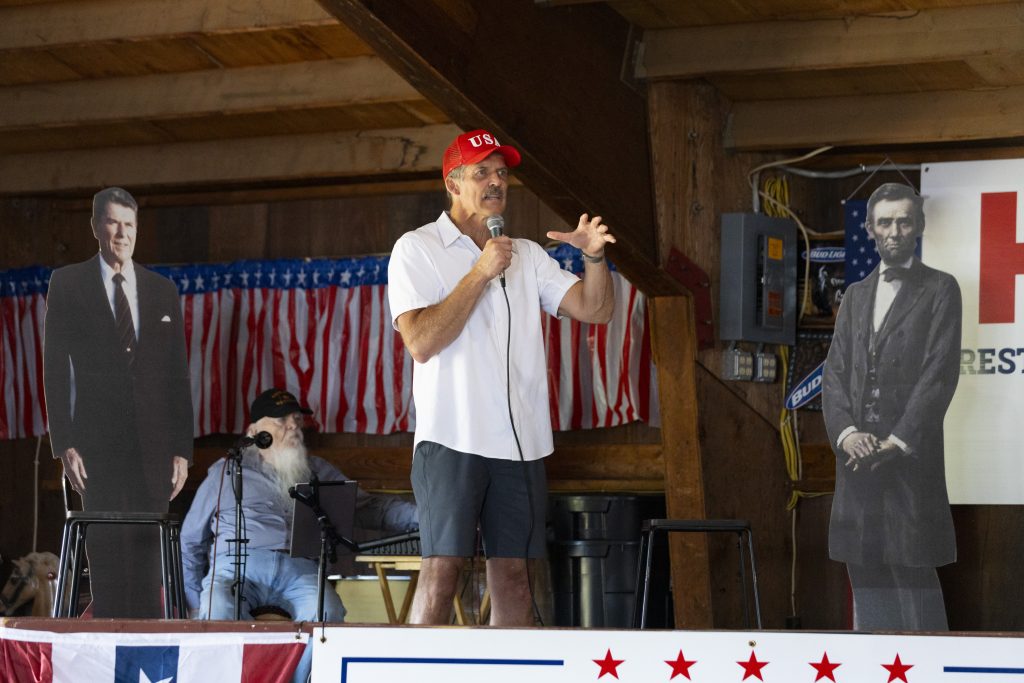
Republican U.S. Senate candidate Eric Hovde addresses the crowd Sept. 21, 2024, during the 9th annual Rally for Liberty at the Manawa Rodeo Grounds in Manawa, Wis. (Joe Timmerman / Wisconsin Watch)
Sporting his now-signature mustache and a red “USA” baseball hat, Hovde hovered at the edge of a barn at the Manawa Rodeo Grounds while he waited his turn to take the stage at the Waupaca County Republican Party’s “Rally for Liberty.” He shook hands with a few eager voters; the crowd murmured as more people realized he had arrived.
He was greeted on stage — flanked by cardboard cutouts of former Presidents Donald Trump, Ronald Reagan and Abraham Lincoln — to hearty applause from members of the party faithful, many of whom were sporting red MAGA hats.
“I’m standing here for the same reason you are all here today — it’s because I love my country,” Hovde said.
The Republican businessman listed four reasons for why he’s running.
First, increased federal spending — which Hovde says inflated prices — needs to be pared back. If it’s not, “we’re bankrupting and jeopardizing our future.”
Next, Democrats have threatened international security, Hovde said. “We have wars all over the world,” Hovde told the crowd in Manawa, arguing the U.S.’s chaotic withdrawal from Afghanistan showed adversaries the United States was weak. “Their incompetence has put the whole world at greater risk,” he said.
And finally, “the Democratic Party has done a great job of, just like all socialist governments, dividing us,” Hovde said. “We’ve got to come together. We have too many big problems in this country.”
He received a standing ovation from the crowd. After taking a couple of questions from the audience, he greeted a line of voters. It was here, and not on the stump, that he was most comfortable — an important quality in a race against a seasoned veteran of retail politics.
With voter after voter, he happily shook hands, looked them in the eyes while they gabbed about the issues that mattered the most to them and then posed for a photo.
That’s the formula some of the state’s top Republicans believe he needs to employ to close the gap with Baldwin.
“Eric Hovde just needs to continue to deliver the message that he’s going to look out for (Wisconsin residents),” U.S. Rep. Tom Tiffany recently told reporters.
Brian Schimming, chairman of the Republican Party of Wisconsin, said Hovde has to contrast himself with Baldwin and “get voters comfortable with him.”
“He does those two things and I think he can win,” Schimming said.
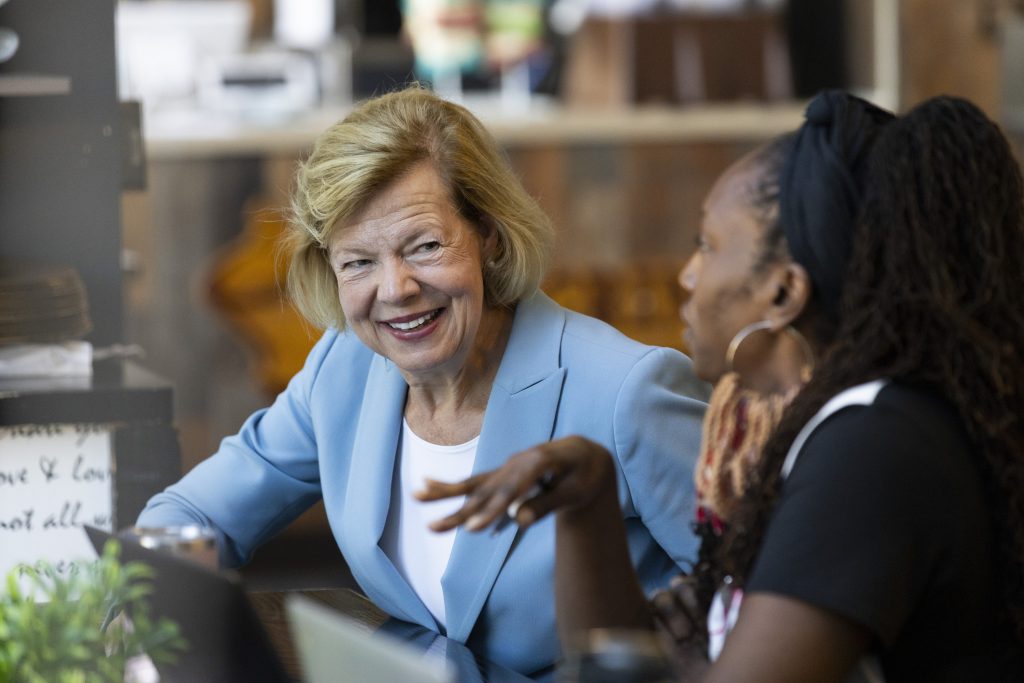
U.S. Sen. Tammy Baldwin, D-Wis., said passing the Women’s Health Protection Act is one of her top priorities if she is re-elected to a third term. (Joe Timmerman / Wisconsin Watch)
Nonpartisan election analysts believe the race is tipping toward Baldwin. The Cook Political Report, Sabato’s Crystal Ball and Split Ticket all rate the race as “leans Democratic.”
Her status as the incumbent, strength among rural voters and prior electoral success put her ahead of Hovde, said J. Miles Coleman, associate editor of Sabato’s Crystal Ball. In Baldwin’s 2018 reelection campaign, she won 29 Wisconsin counties. In 2020, President Joe Biden carried just 14, and in 2022, Gov. Tony Evers won only 16.
“It would be a pretty decent surprise if Baldwin ended up losing,” Coleman said in an interview with Wisconsin Watch. But he noted, Wisconsin almost always features close elections.
“We’re way past the days where (former Democratic U.S. Sen.) Herb Kohl would win two-to-one,” he added.
The race has been about Hovde, not Baldwin, Taylor said, presenting a challenge for a candidate who wants to make the race a “change” election.
“I think he needs to chip away at Baldwin,” Taylor said of Hovde. She said she’s been hearing in recent voter focus groups a “sort of distrust with career politicians,” which gives Hovde an opening.
“He can say, ‘I don’t come from this world,’” Taylor said of Hovde.
“I think his biggest weakness is all of these things that he said, about people in nursing homes, about single moms, about obese people paying more for health care,” Taylor said. “He’s said a lot of things, whether it’s recently or whether it was in his 2012 run for Senate that (Democrats) have been able to clip and run effectively.”
Taylor said she would be watching to see if outside groups, especially on the Republican side, would start to spend more heavily on the race. That could help Hovde, she said, but the resources could be better spent elsewhere, given that Wisconsin is not a top-tier pickup opportunity for Senate Republicans this cycle.
But, Taylor added, given “the nature of Wisconsin elections,” the race is not over.
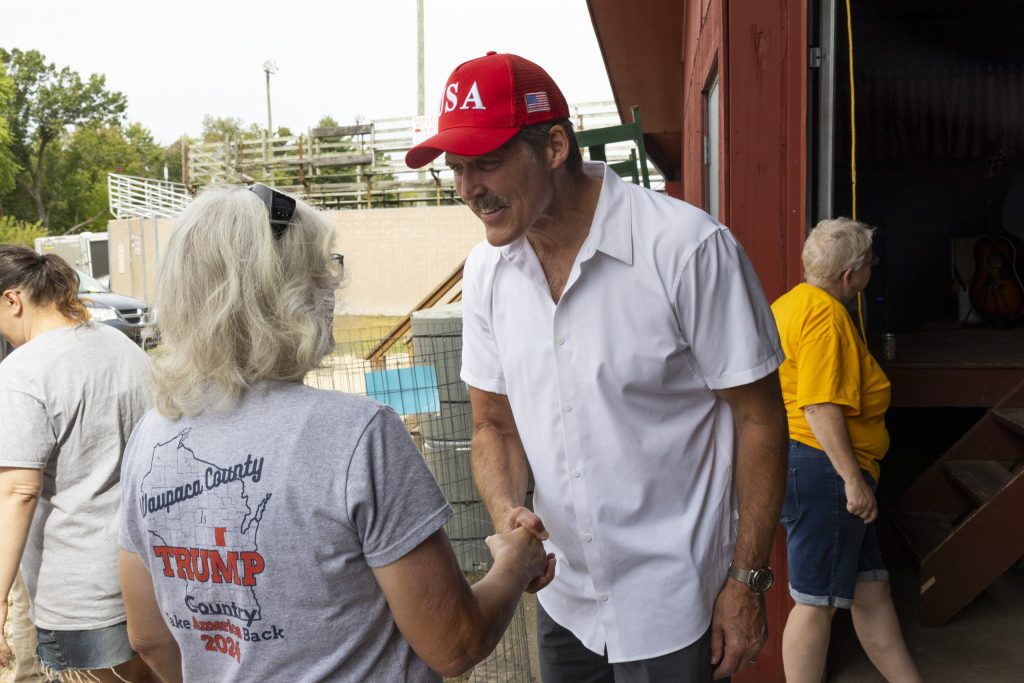
Republican U.S. Senate candidate Eric Hovde wants to cut federal spending to pre-COVID levels to rein in inflation. (Joe Timmerman / Wisconsin Watch)
Both Democrats and Republicans still believe that their respective nominees can win.
Democratic confidence is rooted in Baldwin’s record in Washington. Evers, for example, said Baldwin has “done a lot for Wisconsin.” During the height of the COVID-19 pandemic, Baldwin pushed to bring federal dollars back to Wisconsin, the governor said. He also said her work to establish the simplified 988 suicide prevention hotline and secure funding to replace Blatnik Bridge between Superior and Duluth, Minnesota, shows she’s focused on addressing Wisconsin residents’ pressing needs.
Democrats also have leveled near-nonstop attacks against Hovde, even before he entered the race.
“Hovde’s central challenge is that he has this track record of looking down his nose at regular folks,” Wikler said in an interview. He claimed Hovde doesn’t believe farmers still work hard (Wisconsin Watch has debunked that claim) and has disparaged nursing home residents by saying they’re not “at a point to vote.”
“And the sense that a candidate doesn’t really view you as an equal is a big turnoff to voters,” Wikler said.
Hovde made those comments over the past year and in 2012, when he ran for the U.S. Senate but lost the Republican primary.
Democrats’ favorite line of attack, though, is charging that Hovde isn’t from Wisconsin, reminding voters frequently of his multimillion-dollar home in Laguna Beach, California.
“The thing about Tammy is that she’s authentic,” said state Sen. Kelda Roys, D-Madison, comparing the two candidates. “She’s not a Californian pretending to be a cowboy in a commercial one day and then pretending to be a Wisconsinite the next day.”
That dig is a reference to a series of TV commercials Hovde has filmed for Sunwest Bank, in which he plays the role of a cowboy.
Hovde bristles at those attacks. Sitting at The Outpost Pub & Provisions, a restaurant in Sherwood, he said “every single one of (Democrats’) ads is just a complete, fabricated lie.”
“The biggest constant lie is trying to tell people I’m a Californian,” Hovde said. “Are you kidding me? Do you think I sound like a Californian?”
“How can I be running for the U.S. Senate from Wisconsin if I’m a Californian?” he exclaimed in a Midwestern accent. “I live here. I vote here. I pay my taxes here.”
He further noted that he’s a fourth generation Wisconsin resident, was born and raised in the state, graduated from Madison East High School and earned his bachelor’s degree from UW-Madison.
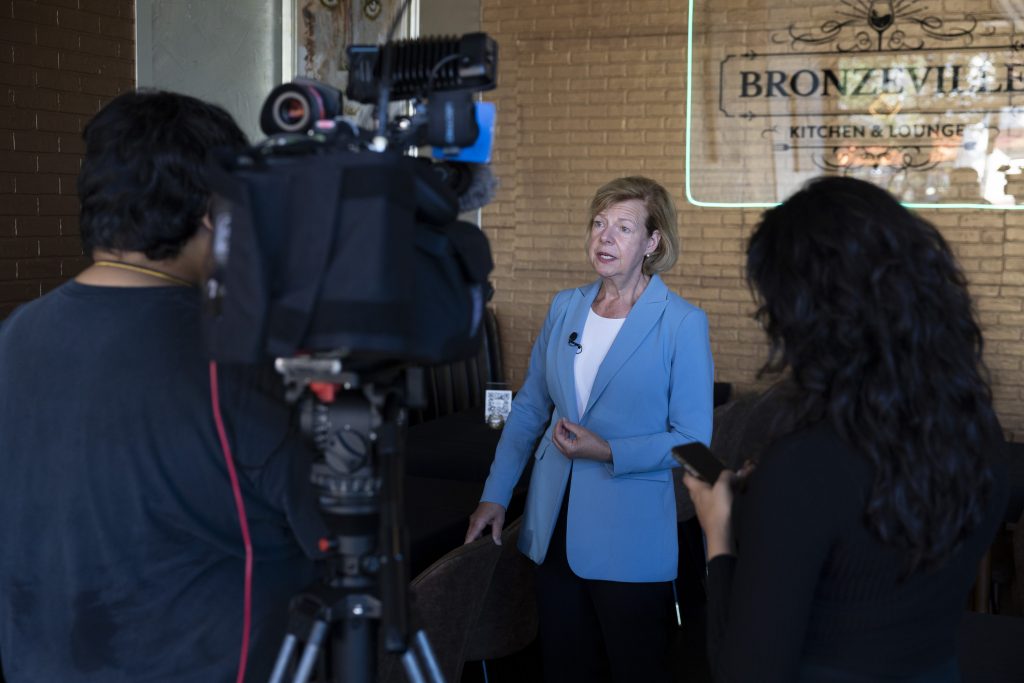
U.S. Sen. Tammy Baldwin, D-Wis., talks to the press after touring the Bronzeville Kitchen & Lounge in Milwaukee on Sept. 4, 2024. Baldwin points to her opposition to an Indo-Pacific trade deal as an example of a disagreement with the Biden administration over the effect it would have on American workers. (Joe Timmerman / Wisconsin Watch)
Republican confidence is rooted in Baldwin’s record in Washington.
Baldwin is having to run away from her record, Schimming said. “That’s a challenge.”
“Tammy has a fairly unremarkable track record in the Senate in terms of achievement — that’s putting it generously,” Schimming continued. “She basically doesn’t have any big legislation to her name.”
Her voting record is also to the left of the state, Schimming said, something that makes her even more vulnerable.
“I would not want to be a 95% or 96% vote with Joe Biden right now,” Schimming said of Baldwin’s support for the current administration’s agenda. “That is not something you want to be.”
Tiffany emphasized “this is a change election.”
“She was groomed from the very beginning to have a long career in politics, and she certainly has. And look at the results in Washington, D.C.,” Tiffany said. “Tammy Baldwin is a Harris-Walz sycophant, and that’s ultimately what is going to get Eric Hovde across the finish line.”
Hovde agreed Baldwin’s time in office works in his favor.
“Has Sen. Baldwin, who’s been in Washington for 26 years, made your life better?” he asked in an interview. “I think the answer is pretty clear. If you look at where our country has gone, by any measurement and means, it has not gone in the right direction under her tenure.”
“I am very proud of my record,” Baldwin said when asked about the GOP attacks.
She pointed to a provision she authored in the Affordable Care Act that allows Americans to stay on their parents’ health insurance until they’re 26; her support for Buy America rules, which mandate that American-made materials be used for certain federally funded projects; and her work to bring down the costs of inhalers, something she says has had real results over the past year.
Baldwin also pushed back on GOP assertions that she’s been a rubber-stamp vote for Biden’s agenda.
“I work for only Wisconsin,” she said. “I don’t work for a president. I work for the state.”
The senator was among a group of Democrats who pushed Biden to halt talks of a trade deal with a series of Indo-Pacific nations over concerns it would be perceived as bad for American workers. She also highlighted that she led a bipartisan effort to get the Food and Drug Administration to stop allowing imitation “dairy” products — almond milk, etc. — to be mislabeled.
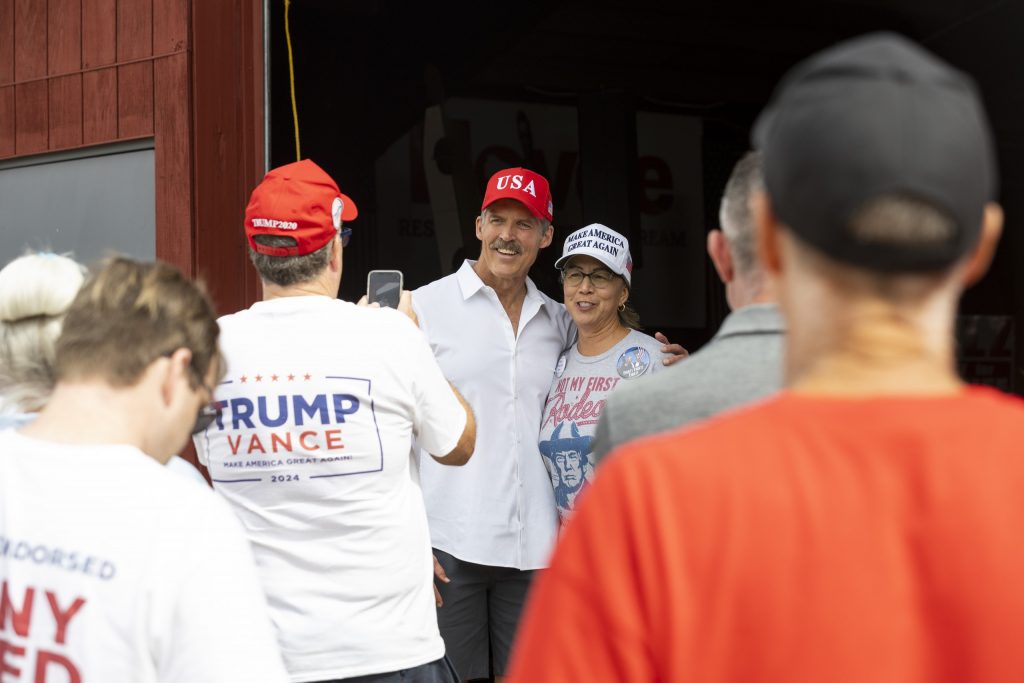
Republican U.S. Senate candidate Eric Hovde has moderated his position on abortion since his 2012 U.S. Senate run when he was anti-abortion. He now supports a referendum that would allow abortions sometime before 12 to 18 weeks of pregnancy and exceptions for rape, incest and the life of the mother. (Joe Timmerman / Wisconsin Watch)
In a race that has focused more on personal attacks than policy, both Baldwin and Hovde offered windows into their policy priorities in interviews with Wisconsin Watch.
Hovde outlined his plans to fight inflation and secure the U.S.-Mexico border.
Broadly speaking, Hovde said, to rein in costs, lawmakers need to “pull spending back to pre-COVID levels.”
“Our population didn’t grow by 40%, so why are we spending 40% more?” Hovde said. “Once you do that, prices will come back.”
Then the country needs to implement “pro-economic growth policies,” the Republican said, namely reducing regulations and cutting back on government mandates, like requirements that a certain percentage of energy production comes from renewable sources.
The same applies to housing costs, said Hovde, a real estate developer.
“Twenty-five to 30% of the cost of any new home built today is tied in with taxes and regulations, impact fees, things of that nature,” Hovde said. If you cut back on the fees developers have to pay, fewer costs will be passed on to the consumer, he said.
On border policy, the Republican businessman said the U.S. should revert to Trump-era rules, such as reinstituting the former president’s so-called “remain in Mexico” policy, which forced non-Mexican asylum seekers to wait in Mexico for their U.S. court dates.
Hovde also said the U.S. needs to change its laws providing broad rights to migrants once they set foot on American soil. Finally, he said the U.S. should finish building a wall along its southern border.
One issue he doesn’t believe the federal government should be involved in is setting abortion policy. Hovde said abortion laws should be established through state referendums.
He said he personally believes in exceptions to abortion bans for rape, incest and medical emergencies and that women should be able to access abortion services early on in a pregnancy. When should abortion be able to be outlawed? Hovde pointed to some countries in Europe, which range from after 12 weeks to after 18 weeks, and said “those all seem like reasonable ranges to me.”
He also attacked Baldwin, whom he charged supports allowing abortions even after fetal viability.
She disputed the premise in an interview.
“The type of abortion that Eric Hovde describes does not happen in America,” she said. “If there is a woman presenting late in her pregnancy for care, it is because something has gone catastrophically wrong, and that’s the only circumstance under which that happens in America.”
She pointed to her Women’s Health Protection Act to demonstrate her stance on abortion policy, which would restore protections established under Roe v. Wade but would still allow states to ban abortion “after fetal viability” with exceptions for medical emergencies.
With another term in the Senate, getting the bill passed would be one of Baldwin’s top priorities — though it would likely face an uphill battle with Republicans expected to retake the majority.
She also would continue to push policies like the Dairy Business Innovation Act, which created a grant program aimed at helping dairy farmers expand their operations and diversify their businesses, or another bipartisan bill she helped author that would provide funding for rural communities to test their wells for so-called forever chemicals.
“I think too many people are probably drinking contaminated water and don’t even have that knowledge,” she said.
So, a month out from Election Day, with the race’s sole debate looming on Oct. 18 at 7 p.m. and many voters finally starting to pay attention, how are both candidates feeling about the race?
“It’s going to be a jump ball right down to the final wire,” Hovde said.
“We have a lot more to do,” Baldwin said.
If you think stories like this are important, become a member of Urban Milwaukee and help support real, independent journalism. Plus you get some cool added benefits.






















Life-sized cardboard cut-outs of Lincoln and Reagan? What were they meant to symbolize? Support for Hovde? Or was Hovde trying to show he is just as stiff as they are?